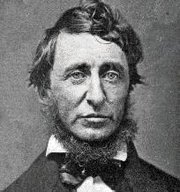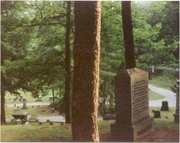Henry David Thoreau
|
|
Henry David Thoreau (July 12, 1817 – May 6, 1862; born David Henry Thoreau) was a noted American author and philosopher who is most famous for Walden, his essay on civil disobedience, and appreciation for nature. He was a lifelong abolitionist, delivering lectures that attacked the Fugitive Slave Law, praised the writings of Wendell Phillips, and even defended radical John Brown.
| Contents |
Life and work
He was born in Concord, Massachusetts, and graduated from Harvard in 1837. There are legends stating Thoreau did not want to pay the five dollar fee required from Harvard College to receive a college diploma or a “sheet of paper;” therefore, he never received it. This is untrue and what actually happened was Harvard College offered a master of arts degree to anyone of its graduates “who proved their physical worth by being alive three years after graduating, and their saving, earning, or inheriting quality or condition by having Five Dollars to give the college.” (Thoreau's Diploma)
Thoreau was a philosopher of nature and its relation to the human condition. In his early years, he accepted the ideas of Transcendentalism, an eclectic philosophy that included among its advocates Ralph Waldo Emerson, Margaret Fuller, and Bronson Alcott.
After college, Thoreau taught school, wrote essays and poems for The Dial, and briefly attempted freelance writing in New York City. The death of his brother in 1842 was a profound emotional shock and may have influenced his decision to live with his parents and never to marry.
Thoreau embarked on a two-year experiment in simple living on July 4, 1845 when he moved to a second-growth forest around the shores of beautiful Walden Pond, as a guest of his friend Ralph Waldo Emerson, a fifteen minute walk from his family in Concord, Massachusetts. On a trip into town, he ran into the local tax collector who asked him to pay six years of delinquent poll taxes (1846). Thoreau refused, purportedly for his opposition to the Mexican-American War, (1846-1848), for which he spent a night in jail. There he wrote his popular essay 'Civil Disobedience.' 'Civil Disobedience' is credited with influencing Leo Tolstoy, Mohandas Gandhi, and Martin Luther King, Jr.. Thoreau left Walden Pond on September 6, 1847.
Henry_David_Thoreau_circa_1879.jpg
Published in 1854, Walden; or, Life in the Woods recounts the two years and two months Thoreau spent at Walden Pond. The book compresses that time into a single calendar year, using the passage of four seasons to symbolize human development. Part memoir and part spiritual quest, this American classic emerged from a nine year process of composition and revision, the lengthy period in part because his previous work, A Week on the Concord and Merrimack Rivers, had been so poorly received.
At various times, Thoreau earned a living by lecturing or working at his family's pencil factory. He invented a machine that simplified production while cutting costs. Later he converted the factory to producing plumbago, used to ink typesetting machines. Frequent contact with minute particles of lead may have weakened his lungs.
After 1850 he became a land surveyor, "travelling a good deal in Concord," and writing natural history observations about the 26 mile² (67 km²) township in his Journal, a two million word document that he kept for 24 years. He also traveled to Canada, Cape Cod, and Maine, landscapes that inspired his "excursion" books, A Yankee in Canada, Cape Cod, and The Maine Woods, in which travel intineraries frame his thoughts about geography, history, and philosophy.
Hailed as the first European-American environmentalist, Thoreau wrote essays on autumnal foliage, the succession of forest trees, and the disperal of seeds, collected in Excursions. Scientists regard these works as anticipating ecology, the study of interactions between species, places, and seasons. He was an early advocate of recreational hiking and canoeing, of conserving natural resources on private land, and of preserving wilderness as public land. Thoreau was also one of the first American supporters of Charles Darwin's theory of evolution. Although he was not a vegetarian, he ate relatively little meat and advocated vegetarianism as a means of self-improvement.
Thoreau was not without his critics. In his lifetime, he was praised by the English novelist George Eliot who wrote in the Westminster Review, "People—very wise in their own eyes— who would have every man's life ordered according to a particular pattern, and who are intolerant of every existence the utility of which is not palpable to them, may pooh-pooh Mr. Thoreau and this episode in his history, as unpractical and dreamy."
Scottish author Robert Louis Stevenson was one of those scoffers, with a sexist twist: "...Thoreau's content and ecstasy in living was, we may say, like a plant that he had watered and tended with womanish solicitude; for there is apt to be something unmanly, something almost dastardly, in a life that does not move with dash and freedom, and that fears the bracing contact of the world. In one word, Thoreau was a skulker. He did not wish virtue to go out of him among his fellow-men, but slunk into a corner to hoard it for himself. He left all for the sake of certain virtuous self-indulgences."
Many of these attitudes began to change after publication in 1906 of the Journal, which revealed the vast extent of Thoreau's writings and ideas. Today he is regarded as a foremost American writer, both for the modern clarity of his prose style and the prescience of his views on nature and politics.
Thoreau died of tuberculosis in 1862, in the town of his birth, Concord. He was buried in Sleepy Hollow Cemetery, Concord.
Henry David Thoreau:
Every creature is better alive than dead, men and moose and pine trees, and he who understands it aright will rather preserve its life than destroy it.
I heartily accept the motto, 'That government is best which governs least'; and I should like to see it acted up to more rapidly and systematically. Carried out, it finally amounts to this, which also I believe? 'That government is best which governs not at all'; and when men are prepared for it, that will be the kind of government which they will have.
Love must be as much a light, as it is a flame.
Why should we be in such desperate haste to succeed and in such desperate enterprises? If a man does not keep pace with his companions, perhaps it is because he hears a different drummer. Let him step to the music which he hears, however measured or far away.
The mass of men lead lives of quiet desperation.
A man is rich in proportion to the number of things he can afford to let alone.
Any fool can make a rule, and any fool will mind it.
As you simplify your life, the laws of the universe will be simpler; solitude will not be solitude, poverty will not be poverty, nor weakness weakness.
I went to the woods because I wished to live deliberately, to front only the essential facts of life, and see if I could not learn what it had to teach, and not, when I came to die, discover that I had not lived.
The surliness with which the woodchopper speaks of his woods, handling them as indifferently as his axe, is better than the mealy-mouthed enthusiasm of the lover of nature.
See also
- Ralph Waldo Emerson
- Transcendentalism
- Civil Disobedience
- Walden Pond
- Ecology
- John Brown
- Abolitionists
- Taoism
Bibliography
- A Week on the Concord and Merrimack Rivers (1849)
- " Civil Disobedience" (1849)
- "Slavery in Massachusetts" (1854)
- Walden (1854)
- "A Plea for Captain John Brown" (1860)
- Excursions (1863)
- Life Without Principle
- The Maine Woods (1864)
- Cape Cod (1865)
- Early Spring in Massachusetts (1881)
- Summer (1884)
- Winter (1888)
- Autumn (1892)
- Miscellanies (1894)
- The Journal of Henry David Thoreau (1906)
Online texts
- Autumnal Tints (http://wikisource.org/wiki/Autumnal_Tints) - courtesy of Wikisource.
- Cape Cod (http://eserver.org/thoreau/capecd00.html) - Thoreau Reader
- On the Duty of Civil Disobedience (http://onlinebooks.library.upenn.edu/webbin/gutbook/lookup?num=71)
- Civil Disobedience (http://wikisource.org/wiki/Civil_Disobedience) - courtesy of Wikisource.
- The Highland Light (http://wikisource.org/wiki/The_Highland_Light) - courtesy of Wikisource.
- The Landlord (http://wikisource.org/wiki/The_Landlord) - courtesy of Wikisource.
- Life Without Principle (http://wikisource.org/wiki/Life_Without_Principle) - courtesy of Wikisource.
- The Maine Woods (http://eserver.org/thoreau/mewoods.html) - Thoreau Reader
- Night and Moonlight (http://wikisource.org/wiki/Night_and_Moonlight) - courtesy of Wikisource.
- A Plea for Captain John Brown (http://onlinebooks.library.upenn.edu/webbin/gutbook/lookup?num=2567)
- Slavery in Massachusetts (http://eserver.org/thoreau/slavery.html) - Thoreau Reader
- Walden (http://onlinebooks.library.upenn.edu/webbin/gutbook/lookup?num=205)
- Walden (http://eserver.org/thoreau/walden00.html) - Thoreau Reader
- Walking (http://wikisource.org/wiki/Walking) - courtesy of Wikisource.
- Walking (http://onlinebooks.library.upenn.edu/webbin/gutbook/lookup?num=1022)
- A Week on the Concord and Merrimack Rivers (http://onlinebooks.library.upenn.edu/webbin/gutbook/lookup?num=4232)
- Wild Apples: The History of the Apple Tree (http://onlinebooks.library.upenn.edu/webbin/gutbook/lookup?num=4066)
External links
- Thoreau David Thoreau ("The Transcendentalists") (http://www.transcendentalists.com/1thorea.html)
- The Writings of Henry D. Thoreau (http://libws66.lib.niu.edu/thoreau/)
- The American Transcendentalist Web (http://www.vcu.edu/engweb/transcendentalism/authors/thoreau/)
- Thoreau Project at Calliope (http://www.calliope.org/thoreau/thoreau.html)
- The Thoreau Society (http://www.aa.psu.edu/thoreau/)
- The Thoreau Reader (http://eserver.org/thoreau/)
- John Updike, "A Sage for All Seasons" (http://books.guardian.co.uk/review/story/0,12084,1246669,00.html) - courtesy of the UK Guardian, an edited extract from the introduction to Updike's new edition of Walden
- A Biography of Thoreau (http://www.easylum.net/node/145) by Ralph Waldo Emerson in Thoreau's republished work, 'Excursions'.bg:Хенри Дейвид Торо
de:Henry David Thoreau et:Henry David Thoreau es:Henry David Thoreau fr:Henry David Thoreau it:David Henry Thoreau he:הנרי דיוויד תורו nl:Henry David Thoreau ja:ヘンリー・デイヴィッド・ソロー pl:Henry David Thoreau pt:Henry David Thoreau ru:Торо, Генри Дэвид sk:Henry David Thoreau sv:Henry David Thoreau uk:Торо Генрі Девід zh:亨利·戴维·梭罗


